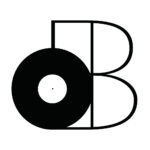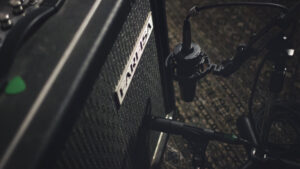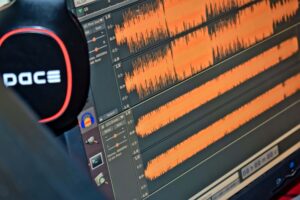One of the most important things to know if you own rights to musical recordings is how to provide yourself with ISRC codes. I’ll be teaching you how to get ISRC codes for your music, regardless of where you live. There are good ways of doing that and there are BETTER ways.
The best way to get ISRC codes for your music is directly through ISRC (isrc.com). However, you’ll realize that the price can quickly become unreasonable if you need multiple ISRC codes at once. I’ll also be talking about other reliable means of acquiring ISRC codes and even some that won’t cost you a dime! ISRC codes are incredibly important if you want to monetize your music in the digital age, so let’s get started.
- What are ISRC codes?
- How much does it cost to get an ISRC code?
- How to get an ISRC code for free
- Should you get an ISRC code for free?
- The most reliable way to purchase ISRC codes
- The most affordable way to purchase ISRC codes
- ISRC codes are all the same at the end of the day
What are ISRC codes?
The International Standard Recording Code (ISRC) is used to identify musical recordings. It’s often confused with the International Standard Musical Work Code (ISWC) code which is attributed to the musical composition (important for writers).
I’ll be covering ISWCs in another article if you’re a composer/songwriter.
One thing both of these codes have in common though… They’re both used to track your music so you can collect royalties more easily. Think of them as the “barcode” for your music.
Traditionally, ISRC codes were embedded into CDs and even audio files.
However, the days of physical release will soon be coming to an end…
ISRC codes are still used for streaming/downloading purposes though. The only difference is that they don’t necessarily need to be embedded into your audio file. The platform you’re using to distribute usually takes care of that for you.
Some of these platforms even assign you ISRC codes (more on tha coming up).
How much does it cost to get an ISRC code?
It’s possible to get your ISRC codes for free, but they can also cost up to 2$ per track. Purchasing them in bulk can get you somewhere in the middle which I believe to be ideal.
Either way, you’ll most likely need to provide yourself with these codes.
Think of it like giving your music its own social insurance number. It’ll be out there working for you, so make sure that you don’t cheap out on your work!
How to get an ISRC code for free
The best way to get an ISRC code for free is to use music distribution services. However, nothing is ever TRULY free in this world. You knew that, right?
Most music distributors automatically assign your tracks with ISRC codes if you don’t.
You’ll also notice that most music distributors charge you a fee. Whether it’s directly out of your pockets or deducted from your earnings, you’ll be paying your dues somehow. That being said, the cost of your ISRC codes are included in those fees.
If you play your cards right though, you can really simplify the process though.
For example, DistroKid costs a mere 20$ per year for unlimited releases. If you release more than 20 tracks per per year, it’d cost you less than 1$ per code. That doesn’t include the cost of the actual distribution service though.
So, could we argue that those ISRC codes were free?
I’ll leave that up to you…
Alternatively, you can also use free music distributors like RouteNote (which charge 15% of your earnings. If you’re not making any money whatsoever, those codes are technically free.
Aren’t they?
Should you get an ISRC code for free?
I personally don’t rely on music distribution services for ISRC codes anymore. It’s mainly because 90% of my music ISN’T available for streaming, but also because I don’t want my codes to be tied to a company I may potentially stop working with in the future.
I’ll be talking more about how I get ISRC codes for my music later.
For now, you just need to determine whether your music will ever be used for anything other than streaming (Apple Music, Spotify, etc…). If the answer to that is YES, then you may want to get your ISRC before uploading them through your music distributor.
However, I guarantee that 99% of you will be fine with codes provided by music distributor.
The most reliable way to purchase ISRC codes
There are really TWO ways to get ISRC codes for your music that are 99.9% reliable. One of those ways is by purchasing through isrc.com (not the official website) and the other is to find a reseller for your particular territory (example, Canada).
The website isrc.com was simply purchased by a group of companies (one of them being Rovix, Inc.), it’s not the website of the code itself. In other words, they’re still an authorized reseller.
Does that make sense?
The only advantage with isrc.com is that it seems to be universal. That means it’s an excellent place to buy regardless of where you are in the world. They’re rated A+ on the Bureau of Better Business (BBB) and are licensed by the Recording Industry Association of America (RIAA).
They’re also approved by the IFPI.
The only reason I don’t use this service is that it costs 2$ per code.
The most affordable way to purchase ISRC codes
The most affordable (yet still 99.9% reliable) way of getting ISRC codes for your music is to purchase the codes in bulk through authorized resellers. The reseller I personally use is SourceAudio (yes, that’s included as part of the service).
SourceAudio provides ISRC codes for its users for 0.10$ per code!
The only catch is that you need to purchase a minimum of 100 codes (which only costs 10$).
The other thing is that you also need to be using the service if you want to keep having access to this deal. It’s a no-brainer for me since SourceAudio is my main platform for hosting my music catalog, but it may not be the same for you…
That being said, they do offer a free-trial for the first month.
I’ll let you figure the rest out for yourself (remember, I didn’t say anything)…
ISRC codes are all the same at the end of the day
At the end of the day, you’re really getting the same wherever you shop. The fact that some ISRC codes cost more than others doesn’t mean that they’re better in any way.
As long as you purchase from authorized resellers, you’ll be fine.
I personally recommend isrc.com or SourceAudio (if you already use it).
If you don’t see/hear your music appearing anywhere other than streaming services, you can simply rely on your music distributor to provide the codes. It’s part of the service and you’re paying for it whether you realize it or not!
So remember, ISRC codes are used to monetize your music more effectively.
Each recording should only have ONE code associated with it. However, each derivative version of the recording should technically be assigned its own ISRC code.
I hope that makes sense and I hope you found this article useful! Feel free to leave us any questions you may have in the comment section and/or to schedule a 1-on-1 coaching call with me to tackle any particular challenges you’re facing in regards to your music career.
Sources
https://www.isrc.com/index.html
https://www.isrc.com/general-faq.html
https://bandzoogle.com/blog/how-to-get-isrc-codes-and-report-your-music-sales-to-soundscan










2 thoughts on “How To Get ISRC Codes For Your Music”
Thanks for this info. We’ve been using isrc.com for obtaining our isrc codes bc it’s cheaper than CD Baby but also for them to embed our metadata but that of course costs extra $$ and adds up when you need more than one. My question is why would I pay them to embed my metadata when I am now realizing that I can do myself for free? We are having them embed for us so we can send the file to radio stations for airplay which I believe is what we need to do or am I not understanding what type of file radio station needs? Thanks for your time
Hey Jessica!
Which file type is the radio station asking for?
In general, it doesn’t really matter if the ISRC code is embedded into the audio file. It would be almost impossible with .wav files and even with other file types that support “permanent” metadata, it would only go in the comment field.
There’s a huge misunderstanding when it comes to metadata…
The radio station has its own system where they need to input the metadata (much like music streaming services). It’s possible that the system can automatically collect the metadata from the file, but some fields will always need to be entered manually.
For example… ISRC, ISWC, UPC/EAN, etc…
That being said, you can just send a spreadsheet with all your metadata instead.
I’d get used to working this way as it’ll keep your metadata organized in one central place. You can always use metadata/tag editor like Meta (what I use) to embed your own files.
I hope that helps! So in my opinion, I think it’s a waste of money (also taking advantage of artists).
Let me know if you have any other questions. Thanks!
– Stefan